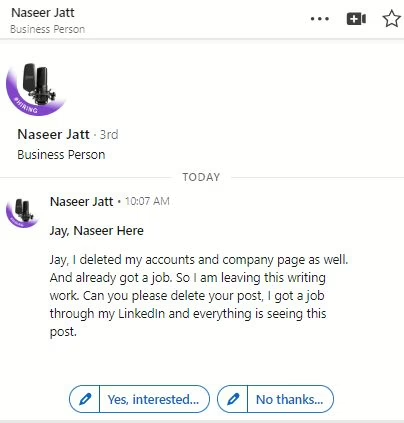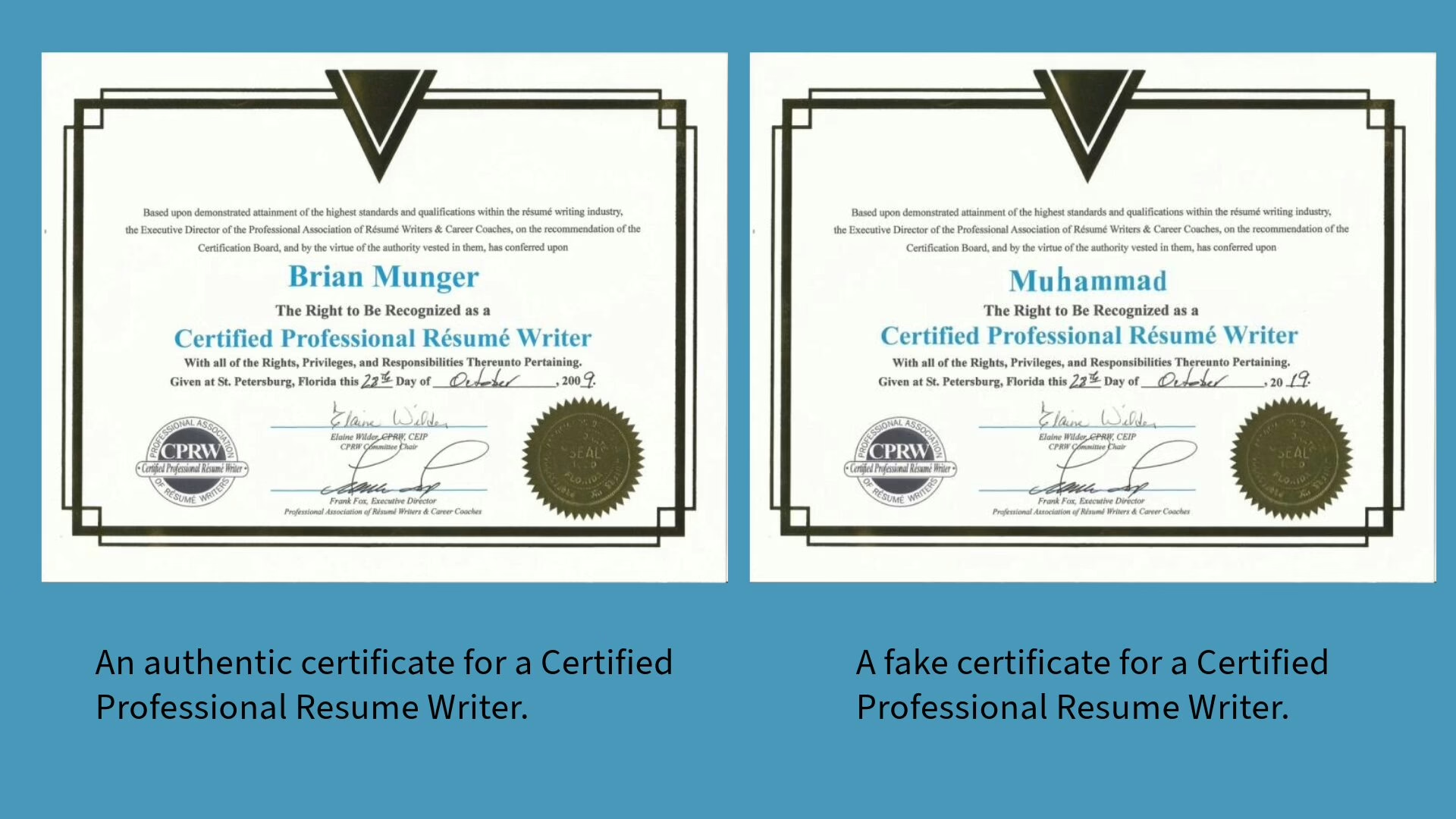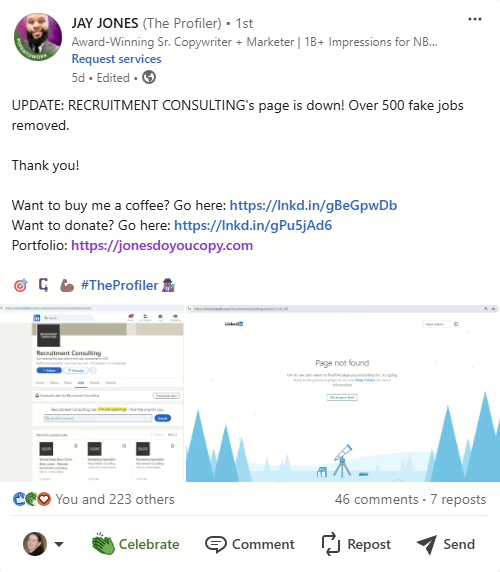One person is more than enough to make a difference.
That’s the mantra that drives Jay Jones to expose the dark underbelly of LinkedIn filled with scammers preying on desperate job seekers. To date, his relentless pursuit of those with nefarious intentions has helped to take down 4,000 fake job ads and uncover scammers posing as resume writers and job recruiters on a quest to steal sensitive information.
He launched his crusade after he was laid off from his job at the end of 2023 and started job hunting. Jones said he turned to LinkedIn because it had a reputation for being a safe place to search for new opportunities. It didn’t take him long to realize the platform was full of scammers posing as job recruiters and resume writers.
When one of these fraudsters reached out to him, he would simply block them and move on. “But then I realized that some people may not realize what’s happening. I’ve seen people who have lost their entire life savings because they lost their jobs and then were scammed on top of it. I got angry and decided to start exposing the fraudsters.”
Finding the fakers
One of the first companies he targeted was TenStarResume Limited.
Naseer Ahmed—who also goes by Naseer Jatt and several other aliases—is the founder of the bogus resume-writing service. After a solid investigation, Jones discovered Ahmed faked entire LinkedIn profiles for his company by stealing the bios and credentials of legitimate resume-writing professionals. Ahmed also used pictures of pretty women to attract users to his scam resume-writing operation. “They had over 3,000 profiles on LinkedIn,” Jones said. “They had been at it for several years.”
At first, Ahmed doubled down, insisting he wasn’t running a scam when Jones first called him out. However, Jones’s relentless pursuit of TenStarResume eventually drove the company off LinkedIn, which he considers a solid win. “They all ran off LinkedIn after my cases. There were hundreds of fake profiles, and he (Naseer Ahmed) was doing this for years. They’re as crooked as a crowbar. I have all the evidence.”

Since that win, Jones has continued to investigate and expose resume writing frauds and recruiting scams on his LinkedIn profile. One of the bogus companies he recently targeted was RECRUITMENT CONSULTING.
The company was convincing desperate job seekers to provide their credit or debit card information, claiming it was to conduct a background or credit check for employment. The scammers stole two legitimate women’s identities to further fake legitimacy. They even went as far as to put a quote on their website claiming it was a review from a satisfied customer. That reviewer—Jay Jones. Yet he never reviewed this business. They did it as a means of trolling him because they don’t care about the damage they cause to job seekers.
This further motivated Jones to get them off LinkedIn. After his continued coverage, and other users reporting them for scamming and abuse, the company’s profile was removed.
Jones continues to expose new fakers every day on his LinkedIn profile. Anyone actively seeking new employment using the platform should follow him to avoid being scammed.
Double-checking that resume-writing certification
One of the ways resume-writing scammers trick unsuspecting job hunters into believing they’re legitimate is by posting certifications and other professional credentials on their LinkedIn profiles. One such person—Muhammad Amjad—shared an official-looking certification document from the Professional Association of Resume Writers declaring him a Certified Professional Resume Writer.

The forged credentials caught the attention of Jones. He shared his receipts proving the credentials were fake. In doing so, he tagged Margaret Phares, the executive director at the Professional Association of Resume Writers and Career Coaches (PARWCC). It was PARCWW that Amjad claimed certified his competency. What Amjad did was take Brian Munger’s real certificate and forge it into one with his name on it.
Phares publicly called out Amjad and others who would pull this scam thinking they won’t get caught. In a LinkedIn post on November 5, she warned: “Did you know that CPRW is copyrighted? It is. Also? If you create a fake certificate to claim a certification from PARWCC that you didn’t earn and it has MY signature on it, that is ALSO considered fraud and falsely represents PARWCC through a forged signature. This is copyright infringement, fraud, and forgery. And yes, we will prosecute. KNOCK IT OFF.”
In a separate post, Phares said the only way to know if a resume writing professional is affiliated with PARWCC or holds any credentials from the organization is to go to the “Find a Professional” section of their website to search by name or location.

LinkedIn’s response to rampant scams
In some cases, LinkedIn responds swiftly and decisively when Jones alerts them to scams on the platform. “And sometimes, I get that blanket ‘we’ve reviewed your complaint, and we found nothing wrong’ response.” LinkedIn hasn’t always appreciated Jones’s efforts. More than once, he’s experienced temporary bans and restrictions on his account after outing fake resume writers or recruiters on the platform.
The most recent time the platform pooh-poohed one of Jones’s reports was when he notified them that a company on the platform had used his likeness and a fake endorsement to make it appear he supported them. He received the ‘we could find nothing wrong’ statement originally. However, when other professionals on the platform started speaking up about it, LinkedIn opened it for a second review and this time determined it was a violation and removed it. “But they wouldn’t have given it a second review if all these people hadn’t backed me up in the comments,” Jones said.

Resume writing and recruitment scam red flags
Jones doesn’t plan to ease up on his pursuit of resume writing and recruitment scams on LinkedIn. He continues to out the fakers once he has enough evidence to support his claims.
He encourages other professionals on the platform to speak up when they spot these bad actors before they can rip off other unsuspecting victims. “If you see it coming beforehand and you’re a lot harder to scam than others may be, share it to help others spot these scams,” he said. Jones also asked others to share his posts when he discusses the latest bad actors to spread the warning far and wide.
Lastly, he suggested everyone pay attention to these common red flags to protect themselves:
- Never link your Facebook (or other social profile) to schedule a meeting. Some fake recruiters use this tactic so they can use complex social engineering campaigns and calendar invites to send malware that can steal your personal information via keystroke logging technology. Legitimate appointment-setting apps never require more than a name, phone number, or email to schedule a time.
- Never scan a QR code to schedule a meeting. QR codes have gained in popularity. However, scammers can use them to embed malicious code that will infect your mobile and other digital devices. Once the code is on your devices, they can use it to steal your identity.
- Never trust accounts with minimal activity. Profiles with limited engagement or posts are most likely not legitimate. Scammers create a bunch of profiles at the same time and then work with one at a time to reel in their victims. They only abandon one and turn to another if their original fake profile is detected and restricted.
- Never trust job headlines that don’t match the advertised position. One recent example Jones shared was for a gaming developer position on a recruiter’s profile who claimed he worked for Korn Ferry (but didn’t).
- Never assume someone works with a company. Just because a person claims they work for a company doesn’t mean they do, Jones warned. Always go to the legitimate company website and search for people who claim to work there.
- Never trust an image on a profile. One of the things scammers do now is steal images from other legitimate professionals’ profiles and use them for their own. Others may rely on stock photo images or use AI to create one. Use Google’s image search feature to find the original source of a profile photo.
The LinkedIn scammer crusade continues
Ideally, Jones said he wants to see every fake resume writer, job recruiter, and company—anyone looking to deceive people monetarily—be gone from LinkedIn. “What the point of being this great place for job seekers if the very people you say you’re helping are getting abused every single day?” he asked.
Jones pointed to a woman who contacted him after being tricked into giving her debit card information in an elaborate hiring scam. She was told she’d been hired by Exelon—a legitimate company—and needed to provide the information to cover the cost of shipping equipment to her for the work-at-home position. “All that happened was the scammers cleaned out her bank account,” said Jones. “They abused someone who was already struggling financially during an extended job hunt by taking what little savings she had left. The sheer scale of what’s happening on this platform is mind-boggling.”
Jones said he has no plans to stop and will continue to weed out the bad apples. “If you’re against what I’m doing, then you have something invested in it.”


This is a wonderful read, about a terrific guy doing big things on LinkedIn. I follow his work, and he amazes me all the time. So many of us are grateful to him.
Thanks for featuring him, and highlighting now only his efforts, but the unfortunate evils out there, particularly from middle eastern countries. It’s frightening.
Thanks for commenting, Pam. And yes, Jay is doing amazing work. LinkedIn should appreciate his efforts to rid their platform of scammers.